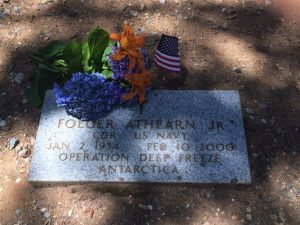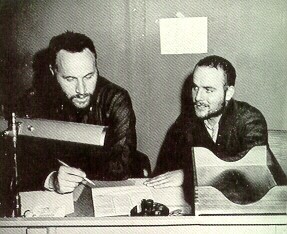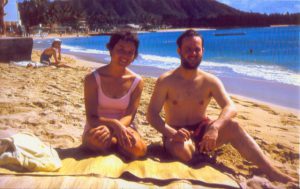
Two weeks ago, I was pondering the appropriateness of writing about my father on the anniversary of his death. Obviously parents are ancestors, but they’re so very close that I wasn’t sure whether it would be considered sufficiently genealogical. Then I got home and read Jeff Record‘s enormously touching tribute to his recently-deceased mother and the answer was clearly a resounding “YES,” so here goes.

I’m probably not the only NEHGS member who’s watched The Crown, a historical fiction series about the current Queen of England and her family. Those of you who’ve seen it may have your own emotionally resonant moments, but for me it was watching a bearded Prince Philip and his fellow shipmates posing with penguins near Antarctica. That minute or two in the drama brought back so much of what my father told me about his thirteen months in Antarctica in 1959–60: the Navy, beards, cold, snow, sled dogs, and, yes … even penguins.
The most memorable exploit I recall (and I believe I’ve remembered the details correctly) involved joint maneuvers with Air Force personnel who had a reputation for being a bit coddled. The Navy guys predicted that their flying compatriots would not be assembled at the appropriate hour … and indeed there were no signs of wakefulness in the shelter where the Air Force guys were sleeping, a sort of insulated fabric Quonset hut. As a Navy officer counted down the seconds to the appointed moment of departure, several of his men simultaneously untethered the shelter along one side. The whole hut flipped back in the stiff Antarctic wind, and Dad said the Air Force guys mobilized very quickly after that!

Immediately after Dad’s return from Antarctica, he got a well-earned “thawing out” in Hawaii with his sister Merry, whose wedding he’d missed seven months earlier. A picture of them together on Waikiki Beach is one of only a couple taken in my father’s life showing him sporting a beard; he felt he could never grow a decent one, but it was a necessity in Antarctica.
My favorite memory about Dad’s time in Antarctica, however, came just a few months before his death. My six-year-old son was learning about Antarctica in school, and said, “I wonder how Grandpa Jerry could stand all that cold?” So I picked up the phone and we called down to California to ask him. It was wonderful to hear new stories and details, including the fact that the only time they wore their dress uniforms was on the Fourth of July, when they gathered in the commanding officer’s hut for a celebration. Evidently even with long underwear it was pretty chilly!
It was wonderful to hear new stories and details…
Not long afterward, as my father lay dying at home, the hospice staff explained that it was quite common for patients to process the experience as a journey. For someone like my father – who’d set foot on every continent – that proved to be very true. At one point he’d scrunched down into an awkward position in bed and, as my half-sisters and step-mother adjusted his pillows to make him more comfortable, he said, “It’s OK, I’ve flown coach my whole life.”
On the night before he died, Dad murmured something about penguins. Hallucinations were the obvious explanation, but then someone turned around and, indeed, there were penguins running around the muted TV screen. It was as if they’d shown up to salute him as he made his final voyage: “Fair winds and following seas, Commander!”
A lovely a moving tribute.
Wonderful. Those who feel that your father is not far enough back on the family tree should consider this a reminder to collect the stories that vital records and census will never supply.
Great stories!
My uncle was a young Navy officer assigned to a destroyer in the North Atlantic just after WWII. He grew a beard on a winter deployment, and one of his duties was to supervise ice removal from the deck. The beard was quickly shaven off after it iced up in the foul weather and his face was frostbitten!
Thank you for this terrific tribute to your dear father, and my deepest sympathy on his passing. What a touching moment when your son interviewed him on the phone for his school report.
A beautiful and well lived life Pamela…
I too wrestled with the appropriateness of writing about my mother – I pondered what it was (if anything) would I be contributing to the genealogical community by doing so….. In the end, we’ve told their stories, and, perhaps shy of a few vital records, I can’t think of anything more valuable to pass on.
So many thanks for this, and to Scott for giving us the freedom to be the sort of family historians we sometimes need to be.
…. I wish I’d known your dad.
Thanks for this touching story. No matter how far away the person may seem at the end, the essence of them is there right under the surface. All it takes is something big (or small, like a TV penguin) to bring it out. Pamela, you’ve inspired me to write about my dad, his life and his death. It’ll take me a while because there’s one moment that still brings me to tears even after four years.
A beautiful and touching memory. It doesn’t matter how far back the descendant is. Every one of them made you the person you are today and that in itself deserves recognition. My dad refused to say much about WWII as he had to fly recon missions. He had to go into the concentration camps the day after they were liberated and take pictures. Pictures I was NOT allowed to see until after his death. I would love to have just an hour with him to ask him questions about the “better” side of his service but we all know that won’t happen so…..
Pamela,
Thank you for this lovely story about your father. I am fascinated now, with my mother in a similar stage, of how the grandchildren are able to help them resurrect memories by asking questions that we as children just never did.